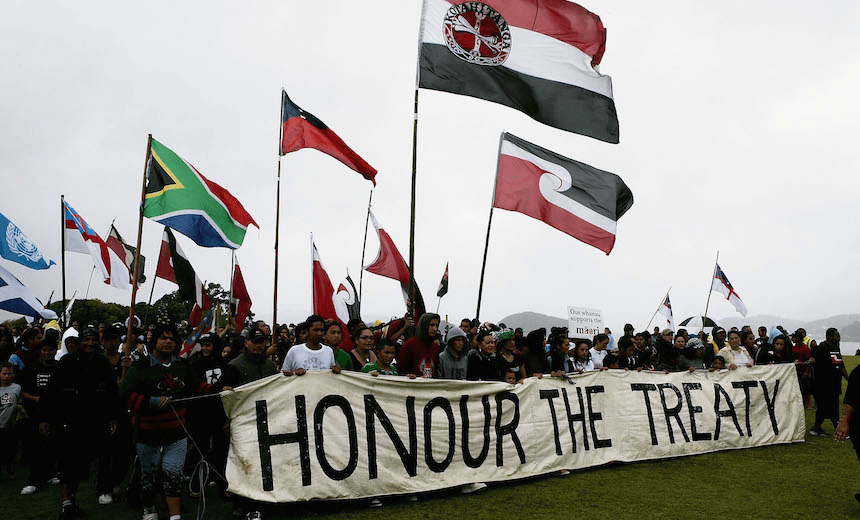From Te Rerenga Wairua at the top of the country, right down to Rakiura, we’re taking a look at our seven Māori electorates and the candidates contesting the seats. In this edition: the ‘super city’ electorate of Tāmaki Makaurau.
Tāmaki Makaurau is a completely urban electorate, centred on greater Auckland south of the Harbour Bridge. To the west it includes the suburbs of Kelston, Glen Eden, Glendene and the Henderson Valley (some west Auckland suburbs such as Te Atatū are part of the Te Tai Tokerau electorate), and the west coast communities from Bethell’s Beach to Whatipu. Further south, its border bisects the Manukau Harbour and incorporates the suburbs around Manukau. Its most southern border runs through Chapel Downs, East Tāmaki, and along the east coast including Cockle Bay and Buckland’s Beach.
There are currently 38,756 people enrolled in the electorate. In the 2017 general election, 19,251 valid candidate votes were cast, only a 59% turn out – the lowest of all seven Māori electorates. Labour’s Peeni Henare won for a second term, with 49% of the vote. Henare has held it since 2014, after Pita Sharples retired from politics, having held the seat since 2005.
Labour also got 58.46% of the party vote in Tāmaki Makuarau.
Four candidates are contesting the seat in 2020. Incumbent Peeni Henare will defend his seat against the Greens’ Marama Davidson, Māori Party co-leader John Tamihere and New Conservative candidate Erina Anderson.
Henare (Ngāpuhi, Te Aupouri, Ngāti Kahu, Te Rarawa, Ngāti Hine, Ngāti Manu, Ngāti Whātua, Te Whakatōhea, Ngāti Kahungunu) comes from a large political family. He is the great-grandson of Taurekareka Henare (MP for Northern Māori, 1914-1938), grandson of Sir James Henare and son of former Māori language commissioner Erima Henare. He is also the cousin of former National MP Tau Henare, and uncle of Labour’s Willow-Jean Prime.
Henare says one of his biggest priorities for Tāmaki Makaurau is housing, arguing that Labour is already getting Māori into homes through the Kainga Ora house building programme and its progressive home ownership scheme. As he explained to The Spinoff, “whānau buy a portion of a house, which means they can start paying off the mortgage, rather than paying rent to a landlord. Over time whanau can buy another portion of the mortgage, until they fully own it.” Henare is the Whānau Ora minister and associate minister for health.
This is Marama Davidson’s (Ngāpuhi, Te Rarawa, Ngāti Porou) third time challenging Henare for the seat. The Greens co-leader lists poverty, public housing and climate as her priorities for Tāmaki Makaurau. “When Māori children are more likely to grow up in damp, mouldy homes; when our rivers are polluted; when our Māori communities are more at risk from sea level rise – these are problems that need bold leadership for real change,” she told The Spinoff. As part of the Greens’ Poverty Action Plan, Davidson is campaigning for a guaranteed minimum income of $325 per week for students and people out of work. She has also advocated strongly during her campaign for wāhine Māori-led solutions to Te Tiriti justice, children’s rights and the environment and has been critical of Oranga Tamariki and child uplift practices.
As number seven on the Māori Party list, John Tamihere (Ngāti Porou, Whakatōhea, Tainui) is unlikely to return to parliament as a list MP. He has held the Tamaki Mākaurau seat once before, from 2002 to 2005 (he was in fact the first ever MP for Tāmaki Makaurau, as Auckland was included in the Te Tai Tokerau electorate prior to 2002). He was unseated by the Māori Party’s Pita Sharples, who held the seat from 2005 to 2014 before retiring from politics.
A long time advocate for urban Auckland Māori, Tamihere is the CEO of Te Whānau o Waipareira urban authority and had a run at the mayoral election in 2019. He advocates for reforming Oranga Tamariki as a Whānau Ora-led organisation and wider Māori Party policies include a separate Māori parliament, te reo Māori as a core subject in schools and higher wealth taxes.
Erina Anderson is listed as the New Conservative candidate for Tāmaki Makaurau but no information about her or her campaign has been released.





